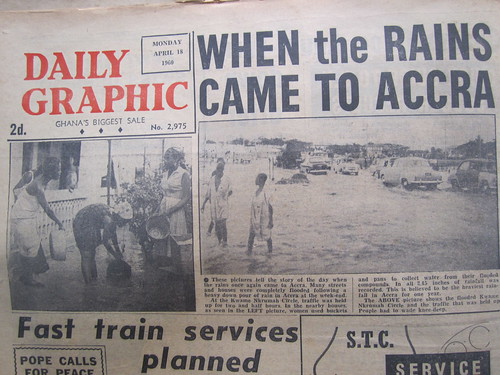Broken Record
The rainy season is so-named because it comes every year, hence one would expect that the authorities would plan for it, but this was the scene on the front page of the Daily Graphic in 1960 when the rains came to Accra with the resulting floods. The headlines 56 years later will likely be the same even with last year's disaster relatively fresh in our minds.
The satirists have already laid their bets: Accra mayor begins ritual of dusting off his annual 'flood speech' as rains set in. Of course the collateral damage has already been felt this year. One prays this year's death toll will be minimized.
Now I hear you: it's complicated. Flood management is difficult even if you're not in the Third World (and you don't have to go the extreme of mentioning Katrina and Sandy and other extraordinary acts of nature to make the point). Flash floods do happen. And yes, you can't simply throw out all the people who have encroached and built on the areas that are ostensibly meant for drains. You need to find a sustainable solution. Oh sure, after every disaster, the bulldozers appear and the Accra Metropolitan Authority workers along with the police knock down the kiosks and other dwellings that have sprung up upending home and livelihood for the unfortunate. And sometimes it is just a matter of excessive garbage, blocked drains and/or the negligence of those who got the juicy contract to maintain the same. Or... I know, I know: everything is local. And anyway why worry about such things from a remove of 6,479 miles?
My mother has accumulated dozens of newspaper columns on this very topic over her 50 year career. And as evidenced by the 1960 front pages, the headlines were writing themselves long before she started. It's a matter of meteorology (it always rains heavily), geography (Kwame Nkrumah circle was always a flash point; the location of the rivers and lagoons in the city), physics and architecture (the design, placement and configuration of streets, houses, roads and drains), engineering (how well those roads and drains were constructed, whether corners were cut after the no-bid contract was awarded, whether proper materials were used) and ultimately slum politics (the perennial tension between the drainage of the Korle lagoon and the growth of the nearby slums full of voters - whether you call one of those touchpoints Agblobloshie, Old Fadama or Sodom and Gomorrah features into the lens through which one views this intractable issue).
But there is a difference between an act of god and an eminently predictable seasonal occurrence. We'll bemoan the lack of a maintenance culture, pay emergency rates for things that ought to be run-of-the mill repairs. Before and after the fact, everyone "knows" what needs to be done. At what point does damage move from collateral to intended? We cheapen Ghanaian lives and compensate with congratulatory funerals while patting ourselves on the back about our unique culture. I dissent. The refrain I've grown up with is that history should not keep repeating itself. And yet we keep sounding like a broken record when the rains come to Accra.
And for bonus points note the other headline on the 1960 front page: "Fast Train Services Planned". We're still waiting for Godot on that front. It's not as if the plans haven't been there as far as the development of Accra goes. Through each era, under each government, no matter how progressive, incompetent (as currently) or indeed how repressive (as thankfully in our past), the plans have always been there. Sisyphus must have been the patron saint of urban planners in Accra.
Lamentable, a playlist
A lamentable soundtrack for this note(spotify version)- Gotta Broken Heart Again by Prince
I should feel bad repurposing this sweet pop trifle but it fits better than New Edition's N.E. Heartbreak. - From A Whisper To A Scream by Allen Toussaint
Esther Phillip's version was my introduction to the late Allen Toussaint's great song. It's perhaps serendipitous in the context of this playlist that there's also a horror movie with that name. - Lament by Miles Davis
Stately yet mournful blues from my favourite album of his, Miles Ahead - Es Lamentable by Sophy
I hope to be proved wrong but I've found the message of this boogaloo concoction gets straight to the point. - Soul Lament by Kenny Burrell Midnight Blue all the way. Normally part of my summer jazz playlist, I can't get enough of Kenny Burrell's sublime guitar. Note: Lonnie's Lament by John Coltrane is an adequate substitute.
- Shame by Alexander O'Neal
The last peak of soul's finest voice paired with Jam and Lewis's immaculate production.I let you get over the last time, if you do it again it's a shame on me.
- It's a Crying Shame by Ruby Turner
We'll up the stakes and end with the obvious. The album is called Paradise and yet it's a crying shame that the paradise of a well run country is denied us. I have no more tears to cry.
File under: Accra, Ghana, flood, disaster, development, infrastructure, history, waste, Africa, policy, politics, urban, strategy, environment, city, planning, culture, observation, toli


No comments:
Post a Comment